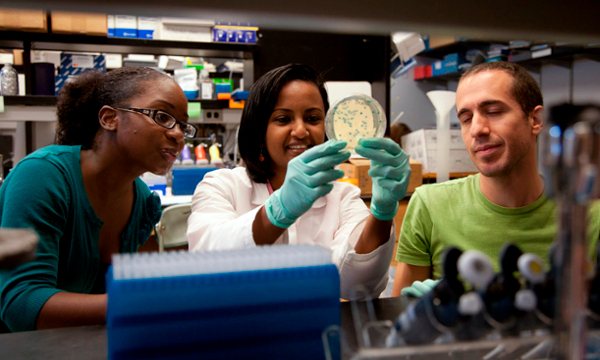First Year
In the first year, MSP students attend classes focused on the fundamental principles of pharmacology, toxicology, biochemistry, and cell biology. They also get research experience through laboratory rotations.
Fall Semester - First Year
| Course Number | Course Name | Credit Hours |
|---|
| IBS 531 | Principles of Pharmacology I | (8 credit hours) |
| MSP 570r | Introductory Graduate Seminar | (2 credit hours) |
| MSP 597r | Lab Rotations | (1 credit hour) |
| MSP 501 | Ethical Issues in Pharmacology | (1 credit hour) |
Spring Semester - First Year
| Course Number | Course Name | Credit Hours |
|---|
| IBS 532 | Principles of Pharmacology II | (5 credit hours) |
| MSP 570r | Introductory Graduate Seminar | (2 credit hours) |
| MSP 597r | Lab Rotations | (2 credit hours) |
| MSP 501 | Ethical Issues in Pharmacology | (1 credit hour) |
Summer Semester - First Year
| Course Number | Course Name | Credit Hours |
|---|
| MSP 699r | Advanced Grad Research | (9 credit hours) |
Second Year
In the second year and beyond, students focus on dissertation research in their chosen laboratory and also attend a handful of upper-level courses in their specialized areas of interest. These upper-level courses focus on a variety of topics such as signal transduction, receptors, ion channels, molecular toxicology, behavior, neuroscience, cancer biology, cardiovascular biology, and chemistry.
Fall Semester - Second Year
| Course Number | Course Name | Credit Hours |
|---|
| IBS 537 | Grant Writing for Molecular and Systems Pharmacology | (2 credit hours) |
| IBS 519 | Intro to Data Analysis | (3 credit hours) |
| MSP 570r | Introductory Graduate Seminar | (2 credit hours) |
| MSP 699r | Advanced Grad Research | (5 credit hours) |
| MSP 501 | Ethical Issues in Pharmacology | (1 credit hour) |
|
Spring Semester - Second Year
| Course Number | Course Name | Credit Hours |
|---|
| MSP 570r | Introductory Graduate Seminar | (2 credit hours) |
| MSP 699r | Advanced Grad Research | (7 credit hours) |
| MSP 501 | Ethical Issues in Pharmacology | (1 credit hour) |
Note: The MSP program is flexible regarding the curricula of MD/PhD students and students who enter the program with advanced standing (e.g., prior graduate degrees). It is often the case that MD/PhD and advanced standing students have taken previous coursework that can substitute for one or several of the courses in the standard MSP program curriculum. In such cases, customized curricula can be developed to optimize the training experience of each individual student.





